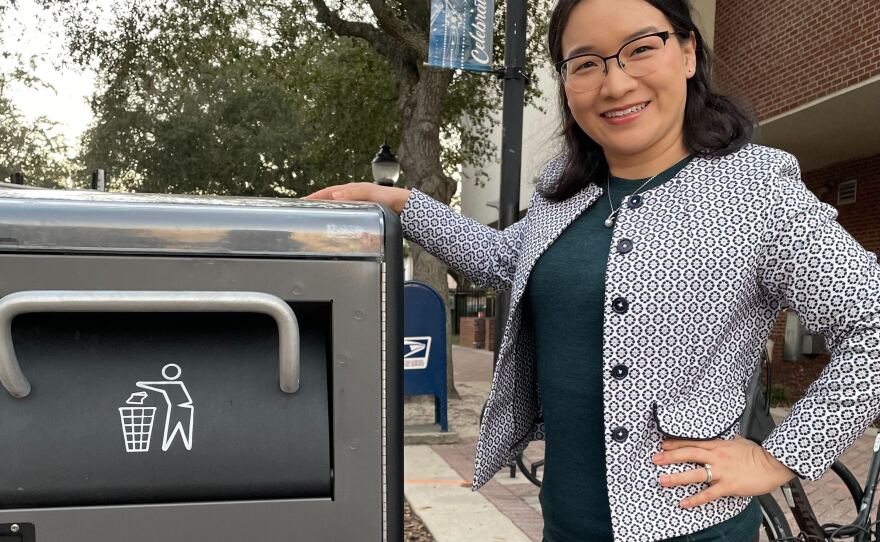Composting, solar energy and the economy were all on the minds of Gainesville residents at a monthly Citizen Climate Advisory Committee meeting. Gainesville’s Chief Climate Officer, Dan Zhu, is in the process of using citizen input to create the city’s Climate Action Plan.
“We have to build food systems and food security into our plans,” Gainesville resident Nancy Deren said at a Jan. 29 meeting. Citizens were allowed a few minutes each to share their opinions, which all echoed fears of global climate change.
“This problem that we’re in…is CO2-induced global warming,” Tom Cunilio, a member of the Center of Sustainable Agroforestry, added.
The public comments, a normal part of each Citizen Climate Advisory Committee meeting, reflected the growing involvement of Alachua County citizens in climate advocacy. Since 2018, the City of Gainesville has broadened its plans to reduce its carbon footprint, most recently the January 2023 appointment of Dan Zhu as the city’s Chief Climate Officer.
One year after taking the position, Zhu said she’s noticed a positive change within the community.
“When I first started this role, I feel like there was some pushback for getting buy-ins from the community,” she said. “But now I have been receiving more and more requests to share our updates.”
Zhu, who earns an $89,000 annual salary from the city, was appointed with the distinct purpose of developing a Climate Action Plan that would set goals for reducing greenhouse gas emissions and create strategies to adapt to climate change.
A draft of the plan is expected to be completed by the end of 2024, Zhu said, and it will continue to take input from the citizen committee.
In her position, Zhu has conducted citizen surveys and vulnerability assessments to determine what the city should prioritize in its Climate Action Plan. Some of the most pressing concerns are food deserts, extreme heat and job security, Zhu said.

“The most direct impact is people feeling the summer get more hot,” she added. “The temperature impacts people’s daily lives.”
Extreme heat, erratic rainfall patterns and more severe hurricanes are some of the main ways climate change will impact North Florida, University of Florida Geography Professor Esther Mullens said. An expert in climate adaptation, Mullens said Gainesville is already beginning to see the effects of a changing climate.
August 2023 was the hottest month on record in Florida, with daily “feels like” temperatures often reaching triple digits. That same month, Hurricane Idalia swept through the Big Bend region of Florida. Idalia rapidly intensified from a Category 2 storm to a Category 4 storm overnight, before causing widespread destruction to Florida’s west coast.
While it’s difficult to attribute a single event to climate change, Mullens said, the severe weather in 2023 was a signal that climate change is beginning to impact North Florida. An already irregular weather event, such as a hot summer or a strong hurricane, is amped up to an even higher degree by climate change.
One of the biggest problems with climate change is that emissions last, Mullens added. Pollution in the atmosphere can stay there for decades, she said, leading to negative impacts further down the road. To reduce future effects of climate change, there has to be a global commitment to reducing emissions, Mullens said.
“What we do in the next 10 years is vital to what our late 21st century is going to look like,” she said.
In many cases, the difference between a city’s success with climate action plans is how involved citizens are in the process.
Austin Britton, a 26-year-old UF graduate student, studies climate action plans in different communities. Many of the cities that develop these plans lack citizen input, he said.
“And those plans often fail because they don’t have that citizen kind of advocacy at any step,” Britton added.
Most climate action plans are developed by only a handful of people, Britton said. Once that handful loses interest or isn’t re-elected, the plan then gets pushed to the side and becomes ineffective. The solution, Britton said, is to include citizens at the conception of the plan.
Most people have an idea of what they want their community to look like, he said, and understand the most pressing problems their city is facing. Citizens bring a diversity of opinions to the table, Britton added, and are vital in keeping their local governments accountable.
“Once you have citizens who’ve bought in,” Britton said, “they’re already interested because they helped develop that plan. They want it to succeed.”
The Jan. 29 citizen committee meeting was the third one Kali Blount, 67, attended. A retired nurse, Blount said he attends and makes public comments at the meetings because he wants to monitor the city’s progress on climate change policy.
While Blount said he believes the Citizen Climate Advisory Committee is dedicated to finding climate solutions, he said it’s often difficult to apply those solutions. To keep local governments accountable, everyday citizens need to be involved in the political process, he said.
“There’s so many people who vote every two years or four years and they think that’s going to do it,” Blount added. “If you don’t watch government, government runs amok.”
Jennison Kipp Searcy, the chair of the Citizen Climate Advisory Committee, said she joined the committee to bring citizen voices to public policy. Kipp, who also works as a UF IFAS extension agent for sustainable communities, said being a mother to her 10- and 15-year-old sons helped inspire her to get more involved in climate action.
“I see the weight of this problem in my kids,” Kipp said.
One of Kipp’s main priorities is to preserve the environment without sacrificing economic stability, she said. Most people view economics and the environment as opposing issues, Kipp said, but she believes the CCAC can find solutions that prioritize both.
“If I can have even the smallest impact through this group of people,” Kipp said, “I’m going to at least try.”



